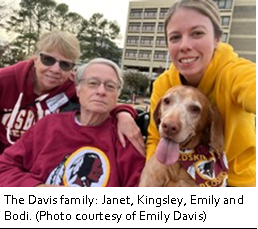Chain of Small Miracles: How CPR, Community and Perfect Timing Saved my Dad
Hi, my name is Emily Davis. My parents have lived in Rose Hill for over 40 years. On the morning of October 10, 2025, a series of ordinary moments aligned in extraordinary ways to save the life of Kingsley Davis, a man known for his warmth and humor and a distinctive neighborhood dog whistle.

Kingsley is my dad and as he stepped outside that day with the family dog, Bodi, to assess our lawn for landscaping, within minutes he collapsed in the yard, unresponsive and in full cardiac arrest.
At that same moment, across the street, two of our neighbors were running behind. Elellan, a punctual student who never runs late for school, happened to be delayed. Her mother, Lemene, pulled their car out of the driveway at a slightly different angle—a subtle shift in routine that became the difference between life and death. From the car, they saw my dad lying on the side of our yard on the ground.
Bodi reacted instantly with a loud, piercing bark—a dog’s instinctive alarm—and then, remarkably, stepped back as Lemene and Elellan ran toward Kingsley, then to our home, banging on the door and shouting for assistance.
Inside, my mother Janet and I rushed outside. 911 was called by our amazing neighbors and as I assessed my father’s condition I immediately began mouth-to-mouth resuscitation and CPR.
“Those first minutes are everything,” the cardiologist would later tell me. CPR kept oxygen circulating to my dad’s brain and vital organs until emergency responders arrived. Doctors made it clear that this quick action was the critical factor in his survival. “You saved his life,” the medical team told me. “CPR is the first line of action in cardiac arrest. Without it, the outcome would have been very different.”
Kingsley was taken to the Cardiac Intensive Care Unit at Fairfax Inova Hospital where he underwent a defibrillator procedure and later transferred to Mount Vernon Inova Hospital for rehabilitation, including speech therapy, physical therapy, and respiratory care. After one month and three days, on Nov. 10, my dad came home where he continues a steady and remarkable recovery.
Our family will never forget the role our neighbors played and what others did while my dad was hospitalized: Offering prayers, dropping off meals, checking in, taking care of Bodi during the day (you know who you are!), and providing the kind of support that transforms a crisis into a shared effort of care.
This experience has reshaped my own perspective on emergency preparedness. I have lifeguarding and Teacher CPR and First Aid skills and I plan to continue CPR education through the American Red Cross and am hopeful that others will consider doing the same.
My dad is alive today because a chain of small miracles—perfect timing, fast action, and lifesaving skills—came together at exactly the right moment.
At that same moment, across the street, two of our neighbors were running behind. Elellan, a punctual student who never runs late for school, happened to be delayed. Her mother, Lemene, pulled their car out of the driveway at a slightly different angle—a subtle shift in routine that became the difference between life and death. From the car, they saw my dad lying on the side of our yard on the ground.
Bodi reacted instantly with a loud, piercing bark—a dog’s instinctive alarm—and then, remarkably, stepped back as Lemene and Elellan ran toward Kingsley, then to our home, banging on the door and shouting for assistance.
Inside, my mother Janet and I rushed outside. 911 was called by our amazing neighbors and as I assessed my father’s condition I immediately began mouth-to-mouth resuscitation and CPR.
“Those first minutes are everything,” the cardiologist would later tell me. CPR kept oxygen circulating to my dad’s brain and vital organs until emergency responders arrived. Doctors made it clear that this quick action was the critical factor in his survival. “You saved his life,” the medical team told me. “CPR is the first line of action in cardiac arrest. Without it, the outcome would have been very different.”
Kingsley was taken to the Cardiac Intensive Care Unit at Fairfax Inova Hospital where he underwent a defibrillator procedure and later transferred to Mount Vernon Inova Hospital for rehabilitation, including speech therapy, physical therapy, and respiratory care. After one month and three days, on Nov. 10, my dad came home where he continues a steady and remarkable recovery.
Our family will never forget the role our neighbors played and what others did while my dad was hospitalized: Offering prayers, dropping off meals, checking in, taking care of Bodi during the day (you know who you are!), and providing the kind of support that transforms a crisis into a shared effort of care.
This experience has reshaped my own perspective on emergency preparedness. I have lifeguarding and Teacher CPR and First Aid skills and I plan to continue CPR education through the American Red Cross and am hopeful that others will consider doing the same.
My dad is alive today because a chain of small miracles—perfect timing, fast action, and lifesaving skills—came together at exactly the right moment.
Recent
Steven Able: What It Means To Be a Coach
November 26th, 2025
Chain of Small Miracles: How CPR, Community and Perfect Timing Saved my Dad
November 20th, 2025
How We Fixed a Shifting Foundation at our Home on Carriage Dr.
May 29th, 2025
Letter to Supervisor Lusk on Highland Drive Redevelopment
March 25th, 2025
New Rose Hill Plaza Redevelopment Survey
September 11th, 2024
Archive
2025
2024
May
2023
August
October
November
Categories
no categories